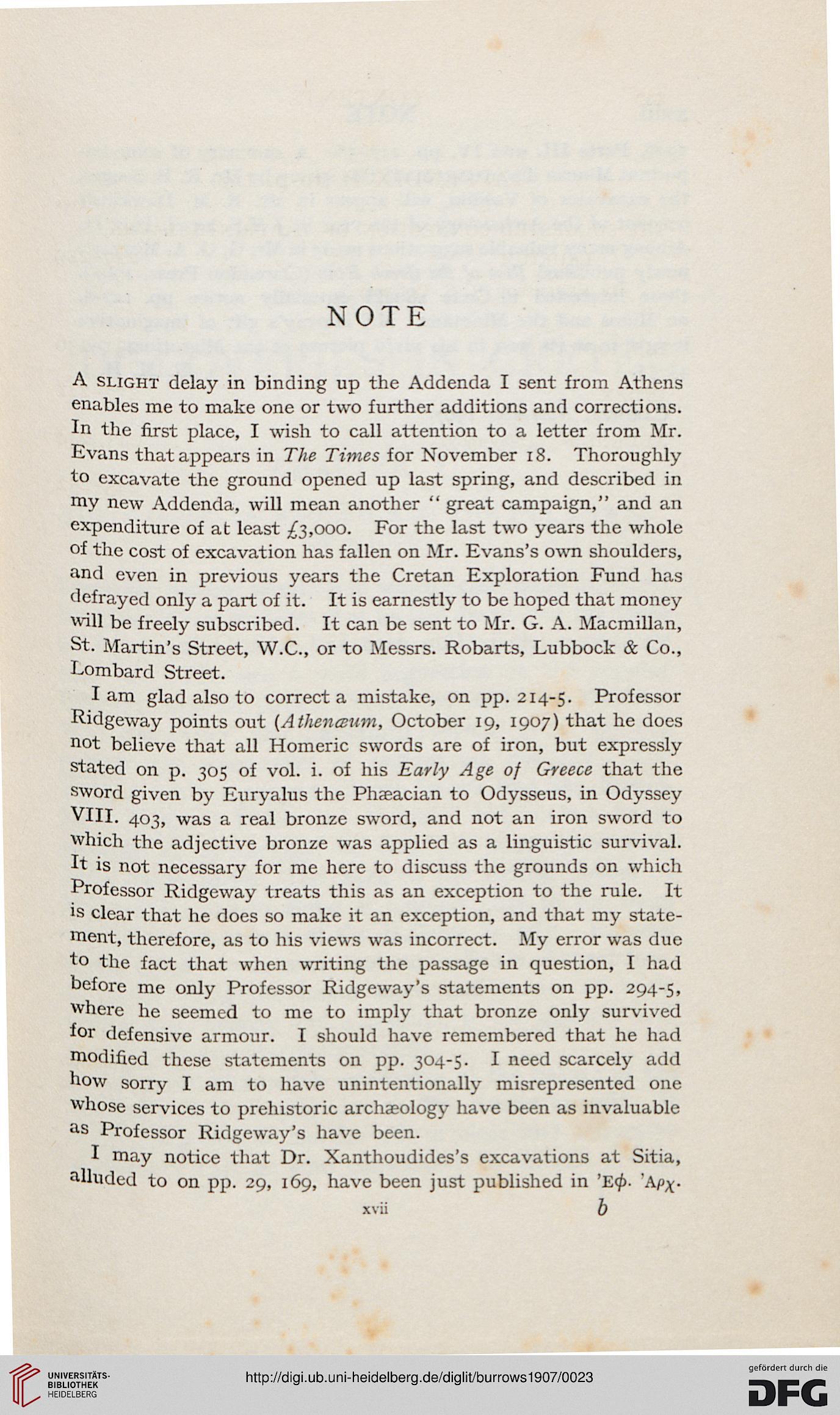NOTE
A slight delay in binding up the Addenda I sent from Athens
enables me to make one or two further additions and corrections.
In the first place, I wish to call attention to a letter from Mr.
Evans that appears in The Times for November 18. Thoroughly
to excavate the ground opened up last spring, and described in
my new Addenda, will mean another " great campaign," and an
expenditure of at least £3,000. For the last two years the whole
of the cost of excavation has fallen on Mr. Evans's own shoulders,
and even in previous years the Cretan Exploration Fund has
defrayed only a part of it. It is earnestly to be hoped that money
will be freely subscribed. It can be sent to Mr. G. A. Macmillan,
St. Martin's Street, W.C., or to Messrs. Robarts, Lubbock & Co.,
Lombard Street.
Iam glad also to correct a mistake, on pp. 214-5. Professor
Ridgeway points out (Athenaam, October 19, 1907) that he docs
not believe that all Homeric swords are of iron, but expressly
stated on p. 305 of vol. i. of his Early Age of Greece that the
sword given by Euryalus the Phaacian to Odysseus, in Odyssey
VIII. 403, was a real bronze sword, and not an iron sword to
which the adjective bronze was applied as a linguistic survival.
It is not necessary for me here to discuss the grounds on which
Professor Ridgeway treats this as an exception to the rule. It
•s clear that he does so make it an exception, and that my state-
ment, therefore, as to his views was incorrect. My error was due
to the fact that when writing the passage in question, I had
before me only Professor Ridgeway's statements on pp. 294-5,
where he seemed to me to imply that bronze only survived
for defensive armour. I should have remembered that he had
modified these statements on pp. 304-5. I need scarcely add
how sorry I am to have unintentionally misrepresented one
whose services to prehistoric archaeology have been as invaluable
as Professor Ridgeway's have been.
I may notice that Dr. Xanthoudides's excavations at Sitia,
alluded to on pp. 29, 169, have been just published in 'E<p. 'Apx-
xvii b
A slight delay in binding up the Addenda I sent from Athens
enables me to make one or two further additions and corrections.
In the first place, I wish to call attention to a letter from Mr.
Evans that appears in The Times for November 18. Thoroughly
to excavate the ground opened up last spring, and described in
my new Addenda, will mean another " great campaign," and an
expenditure of at least £3,000. For the last two years the whole
of the cost of excavation has fallen on Mr. Evans's own shoulders,
and even in previous years the Cretan Exploration Fund has
defrayed only a part of it. It is earnestly to be hoped that money
will be freely subscribed. It can be sent to Mr. G. A. Macmillan,
St. Martin's Street, W.C., or to Messrs. Robarts, Lubbock & Co.,
Lombard Street.
Iam glad also to correct a mistake, on pp. 214-5. Professor
Ridgeway points out (Athenaam, October 19, 1907) that he docs
not believe that all Homeric swords are of iron, but expressly
stated on p. 305 of vol. i. of his Early Age of Greece that the
sword given by Euryalus the Phaacian to Odysseus, in Odyssey
VIII. 403, was a real bronze sword, and not an iron sword to
which the adjective bronze was applied as a linguistic survival.
It is not necessary for me here to discuss the grounds on which
Professor Ridgeway treats this as an exception to the rule. It
•s clear that he does so make it an exception, and that my state-
ment, therefore, as to his views was incorrect. My error was due
to the fact that when writing the passage in question, I had
before me only Professor Ridgeway's statements on pp. 294-5,
where he seemed to me to imply that bronze only survived
for defensive armour. I should have remembered that he had
modified these statements on pp. 304-5. I need scarcely add
how sorry I am to have unintentionally misrepresented one
whose services to prehistoric archaeology have been as invaluable
as Professor Ridgeway's have been.
I may notice that Dr. Xanthoudides's excavations at Sitia,
alluded to on pp. 29, 169, have been just published in 'E<p. 'Apx-
xvii b




